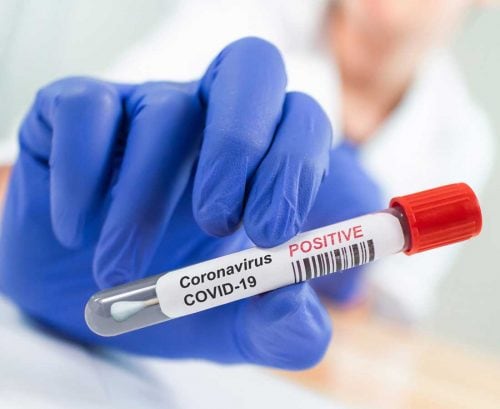
A Hong Kong man was reported this week to be the first person documented as having caught COVID-19 twice.
The man was diagnosed with the novel virus first in late March then tested positive again, almost four months later, on 15 August. Genome sequencing showed the man’s infections were from two different strains of the virus.
Researchers say the finding was not unexpected given the millions of cases of COVID-19 around the world.
University of Otago Department of Microbiology and Immunology associate professor James Ussher says the possibility of reinfection of COVID-19 ‘is not a great surprise’.
“The researchers confirmed that it was reinfection, rather than prolonged shedding of non-infectious virus (which is now well described), by showing this virus differed from the one the person was originally infected with by genome sequencing. Given that reinfection with endemic human coronaviruses, which cause a significant proportion of colds, is well described, it is not surprising that reinfection can also occur with SARS-CoV-2,” Dr Ussher says.
COVID symptoms were milder second time round
The man was hospitalised with mild symptoms with his first infection but in the second infection he was asymptomatic.
Clinical microbiologist and infectious diseases physician David Murdoch says the man’s reaction to the infection was a textbook immune response, and the initial infection may have given him protection from moderate or severe symptoms the second time round.
“These findings are consistent with an expected immune response to a new virus, and suggest that a first infection may protect a person from moderate or severe disease a second time. However, this is still one unpublished case and we need much more information in order to understand immunity to COVID-19,” Professor Murdoch says.
Vaccination still effective
Vaccinologist Helen Petousis-Harris agrees the case does not provide enough information to draw conclusions from and does not bring into question the efficacy of vaccines under development.
“This finding does not necessarily have bearing on the vaccines under development because they are not mimicking natural infection. In the case of this coronavirus, natural infection actually interferes with the immune response, something that vaccines will not have to contend with. I am inclined to keep an open mind and not jump to conclusions,” Dr Petousis-Harris says.
Repeat infection not unusual
There is the potential to get any infectious disease a second time, according to University of Auckland Immunisation Advisory Centre director Nikki Turner.
“We know that repeat infections occur with other coronaviruses, influenza viruses and other common respiratory illnesses. The duration of immunity following the first infection varies both with the type of organism and the immune response from the person infected,” Dr Turner says.
Medications and medical conditions that affect immune response can have an effect on how likely a person is to be reinfected with a virus, she says.
“When someone does get sick again from the same virus, it is usually more mild as there is some existing immunity, but the immunity is not adequate to fully protect. I understand that is what was seen in this case.”
Much more to learn about COVID immunity
The experts agree much more information is needed than this single case to better understand how immunity to COVID-19 works.
“There is still a lot unknown about the duration of immunity following infection with COVID-19, and over time more will become established about how long duration of immunity is expected to be,” Dr Turner says.
The study of the man’s case will be published in the Clinical Infectious Diseases journal.
Ways to support a healthy immune system
There’s no evidence that what we eat can prevent infection from coronavirus but our best chance of fighting off infection from any common virus, such as cold or flu, is by keeping our immune system well supported before we get sick. Keeping our gut bugs in peak condition by eating a range of fibre-rich whole foods, as well as supporting them with pre-and probiotics is a good place to start.
Maintaining our weight within a healthy range and getting regular exercise can also keep our immune systems in better shape.
If you’re a big believer in vitamin C and zinc to help fight infections, it’s better to make sure you get adequate amounts before getting sick, rather than dosing up afterwards.
And we need to try to get a dose of vitamin D by exposing our skin to some sunlight, daily, while, of course, being sun smart.
Regular and thorough hand washing, following cough and sneeze etiquette, physical distancing and wearing face masks or coverings are, in combination, our best defence against catching or spreading COVID-19.
Article sources and references
- Fields H. 2015. The Gut: Where Bacteria and Immune System Meet. John Hopkins Medicine, hopkinsmedicine.org Accessed February 2018 https://www.hopkinsmedicine.org/research/advancements-in-research/fundamentals/in-depth/the-gut-where-bacteria-and-immune-system-meet
- Collins, C. 2020. 5 ways nutrition could help your immune system fight off the coronavirus. The Conversation, March 17. https://theconversation.com/5-ways-nutrition-could-help-your-immune-system-fight-off-the-coronavirus-133356
- Jean Hailes for Women’s Health. 2020. Vitamin D https://www.jeanhailes.org.au/health-a-z/bone-health/vitamin-d
- Frei R et al. 2015. Prebiotics, probiotics, synbiotics and the immune system: Experimental data and clinical evidence. Current Opinion in Gastroenterology 31:153-8 https://www.ncbi.nlm.nih.gov/pubmed/25594887
www.healthyfood.com











